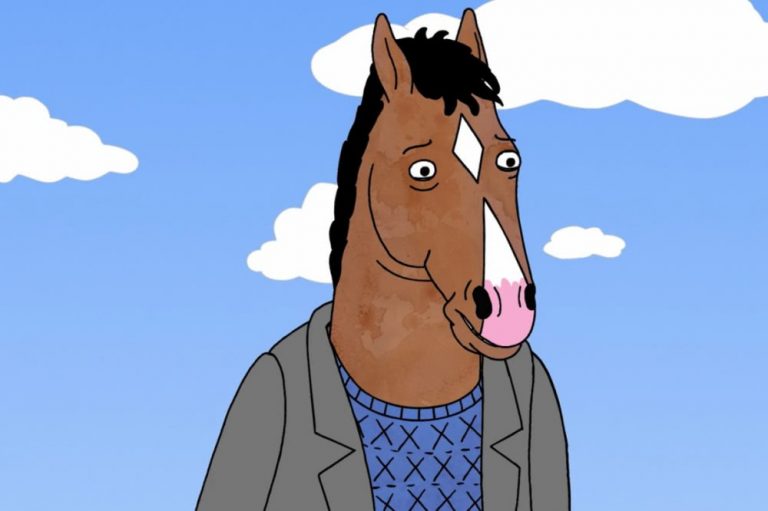When it first premiered back in 2014, there didn’t seem to be much that made Bojack Horseman special. Sure, it boasted an impressive voice cast, led by Will Arnett as Bojack, the show’s titular washed-up horse, but it appeared to be one more adult animated comedy in a sea of adult animated comedies; a sitcom in all but name that, especially in its early episodes, cartwheeled between satirical jabs levelled at our celebrity obsessed media landscape and surrealist, multi-coloured non-sequiturs.
Critics got their knives out, with Erik Adams of the AV Club proving particularly vicious. “It spoofs the emptiness of celebrity, but does so without any novelty or true insight,” the writer savaged. He wasn’t alone either. The big question surrounding the first half of the debut season was not even whether Bojack was good; it was, “Why would anyone watch a show like Bojack Horseman?”
https://www.youtube.com/watch?v=Bf12qwPWDVI
But critics – and audiences, for that matter – were jumping the gun. Those early episodes were not the meat of the show, nor even a fair indication of where it would end up. They were set-ups, not for a joke, but for a kind of anti-joke; the kind of devastating punchline that Bojack’s writers have spent three years honing.
Because Bojack is not really a story about celebrity, although, in its newly released fourth season, it certainly saves a lot of vitriol for politicians who run campaigns as though they are vying for the Miss America crown. Nor is it really a show about artistry – its central band of outsiders might feature a writer, an actor, a talent rep and a businessman, but Bojack is less about their creative pursuits and more about the ways in which they fuck them up.
The annals of TV’s history might be stuffed with pricks, but Bojack is a different kind of monster.
No. At its heart, Bojack is a show about trauma; more specifically, the ways in which we inherit trauma, and find ourselves, often to our growing horror, transforming from victims to oppressors. It is a show about the ways in which violence can linger – the ways in which torment can echo throughout the years, manifesting itself over and over again in a range of different, insidious ways. And it is a show about waking up and discovering that you have slowly transformed into your parents; that you have become a cog in a machine of multi-generational pain.
That’s what sets Bojack as a character apart, particularly in the show’s fourth season, which he spends much of while off-screen, lurking beneath the surface like a tumour pressing against the back of an eye. The annals of TV’s history might be stuffed with pricks, but Bojack is a different kind of monster. He is not a Don Draper-type, a booze-sodden chameleon desperate to reinvent himself whenever he gets the chance. Nor is he a Stringer Bell, a cool, calm and collected sociopath, his heart one hardened, time-wearied callous. And he is certainly not a Tony Soprano, that ethically ambiguous titan with a set of values that remain steel cut and shining despite the murk he finds himself surrounded by.
Bojack is no longer just unashamed of pissing on his subordinates, and tearing apart his loved ones; he is unable to conceive of behaviour that does not somehow inflict hurt.
After all, those characters are, at heart, creatures of principle. Draper might be a womanising jerk, but he is a consistent womanising jerk; as regular in his indiscretion as a stopwatch. And both Bell and Soprano are only likeable because they are unwavering – like good captains, they follow the ship all the way down, and never once retreat from their ideals, no matter the demons that means they must face.

Bojack, again, is something else. Bojack is the human desire for self-preservation made physical; a character reduced to its most basic, fundamental properties. Bojack is a survivor, but not in the way that we usually mean that word. He has not so much learnt from trauma as he has been forever claimed by it; whether dealing with the vicious figure of his mother in season four’s ‘Thoughts And Prayers’ and ‘Stupid Piece of Shit’, or attempting to find himself in ‘The Old Sugarman Place’ he cannot escape the legacy of the past.
Nor does he even particularly want to. Whereas in the first few seasons Bojack’s unrepentant assholery was largely played for laughs – he was a character willing to destroy his friend Todd’s life for no other reason than petty jealousy, and a desire not to be left alone – by season four, it has become pathological. Bojack is no longer just unashamed of pissing on his subordinates, and tearing apart his loved ones; he is unable to conceive of behaviour that does not somehow inflict hurt. He has moved beyond the level of your petty jerk, and has become something else entirely – the legacy of familial pain writ large.
If that sounds like a bummer, that’s because it sometimes is. The fourth season of Bojack Horseman might feature zombies, and a guest spot from Matthew Broderick, and heavy dashes of the kind of Jacques Tati-esque fuckery that the show has become well-known for. But it is, at its heart, one of the most convincing portrayals of survivor’s guilt yet put to screen; the story of a character who has been quietly given himself over to his trauma as one would a lover.
Why would anyone watch a show like Bojack Horseman? Because it’s a show that reminds us, for horses as for humans, that pain begets pain; that although we may be through with the past, the past is not yet through with us.
The complete fourth season of Bojack Horseman is available now via Netflix.


































